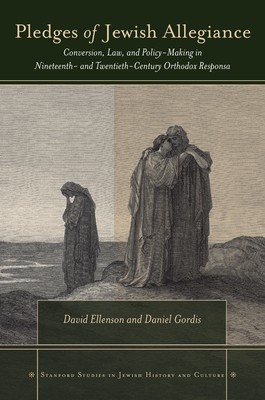
- We will send in 10–14 business days.
- Author: David Ellenson
- Publisher: Stanford University Press
- ISBN-10: 0804778051
- ISBN-13: 9780804778053
- Format: 15.5 x 23.1 x 2.3 cm, kieti viršeliai
- Language: English
- SAVE -10% with code: EXTRA
Reviews
Description
Since the late 1700s, when the Jewish community ceased to be a semiautonomous political unit in Western Europe and the United States and individual Jews became integrated--culturally, socially, and politically--into broader society, questions surrounding Jewish status and identity have occupied a prominent and contentious place in Jewish legal discourse. This book examines a wide array of legal opinions written by nineteenth- and twentieth-century orthodox rabbis in Europe, the United States, and Israel. It argues that these rabbis' divergent positions--based on the same legal precedents--demonstrate that they were doing more than delivering legal opinions. Instead, they were crafting public policy for Jewish society in response to Jews' social and political interactions as equals with the non-Jewish persons in whose midst they dwelled.
Pledges of Jewish Allegiance prefaces its analysis of modern opinions with a discussion of the classical Jewish sources upon which they draw.
EXTRA 10 % discount with code: EXTRA
The promotion ends in 22d.22:13:52
The discount code is valid when purchasing from 10 €. Discounts do not stack.
- Author: David Ellenson
- Publisher: Stanford University Press
- ISBN-10: 0804778051
- ISBN-13: 9780804778053
- Format: 15.5 x 23.1 x 2.3 cm, kieti viršeliai
- Language: English English
Since the late 1700s, when the Jewish community ceased to be a semiautonomous political unit in Western Europe and the United States and individual Jews became integrated--culturally, socially, and politically--into broader society, questions surrounding Jewish status and identity have occupied a prominent and contentious place in Jewish legal discourse. This book examines a wide array of legal opinions written by nineteenth- and twentieth-century orthodox rabbis in Europe, the United States, and Israel. It argues that these rabbis' divergent positions--based on the same legal precedents--demonstrate that they were doing more than delivering legal opinions. Instead, they were crafting public policy for Jewish society in response to Jews' social and political interactions as equals with the non-Jewish persons in whose midst they dwelled.
Pledges of Jewish Allegiance prefaces its analysis of modern opinions with a discussion of the classical Jewish sources upon which they draw.


Reviews